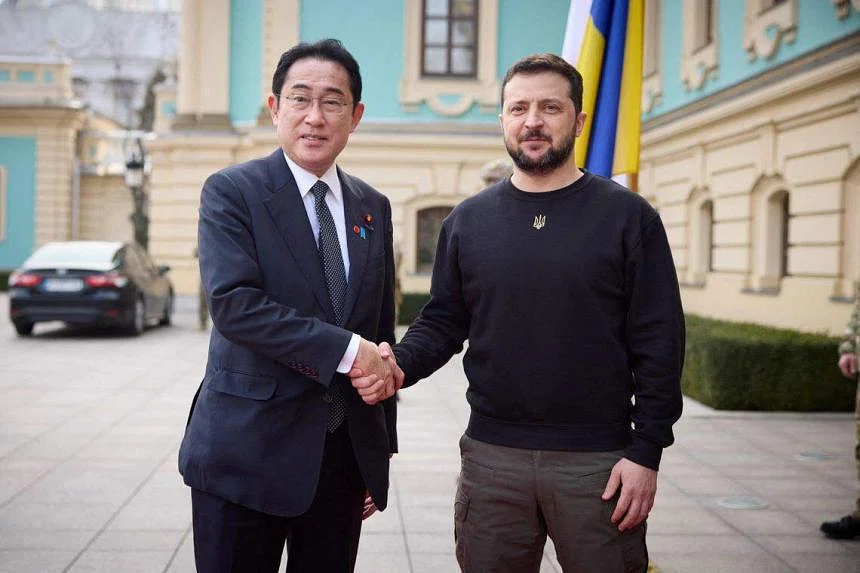March 22, 2023
BEIJING – President Xi Jinping and his Russian counterpart Vladimir Putin have inked a joint declaration to advance their strategic partnership, while Mr Putin has said he is committed to restarting peace talks “as soon as possible”.
Both leaders discussed the Ukraine war during their meeting on the second day of Mr Xi’s visit to Moscow, and both sides “oppose any country or group of countries seeking military, political and other advantages to the detriment of the legitimate security interests of other countries”, the Chinese Foreign Ministry said in a late-night statement on Tuesday.
They also called for a halt to actions that could push the crisis out of control, said the statement.

Russian President Vladimir Putin and Chinese President Xi Jinping sign a joint declaration to advance their strategic partnership, in Moscow, on March 21, 2023. PHOTO: REUTERS
The two leaders’ joint declaration comes as Japanese Prime Minister Fumio Kishida made a surprise, deliberately timed trip to war-torn Ukraine – on the other side of Russia’s border – in a show of solidarity and support for President Volodymyr Zelensky.
Mr Xi’s visit to Moscow this week has sparked concerns that he might promote a ceasefire that the United States says will benefit Russia by allowing it to consolidate its grip on Ukrainian territory.
During a four-hour discussion on Monday, Mr Putin said he had carefully studied China’s 12-point position paper on a political settlement and was open to discussing it further.
The paper, released in February on the first anniversary of the Ukraine war, contained broad principles such as the need for peace talks and a respect for sovereignty, but no specific proposals on how to end the war.

Russia’s delegation, headed by President Vladimir Putin (left), and China’s delegation, headed by President Xi Jinping, attend talks at the Kremlin, in Moscow, on March 21, 2023. PHOTO: EPA-EFE
Despite Beijing’s exhortations of dialogue to resolve the conflict, Mr Xi’s visit to Moscow has been viewed as a strong show of support for an isolated leader who now faces a warrant of arrest by the International Criminal Court at The Hague for the abduction of Ukrainian children.
Beijing has framed Mr Xi’s trip as one of “friendship, cooperation and peace”, but the US has been critical of China’s intentions, with Secretary of State Antony Blinken saying that the visit provided “diplomatic cover” for Russia to continue to commit war crimes.
Chinese state media have played up the Chinese leader’s first overseas visit since he was re-elected state president for a third term earlier this month, hailing it as “adopting a new vision, a new blueprint and new measures for the growth of China-Russia relations in the years to come”.

Chinese President Xi Jinping (left) and Russian President Vladimir Putin arrive for talks between Russia and China, at the Kremlin, in Moscow, on March 21, 2023. PHOTO: EPA-EFE

China’s delegation, headed by Chinese President Xi Jinping (centre), attends talks between Russia and China at the Kremlin, in Moscow, on March 21, 2023. PHOTO: REUTERS
In Moscow, President Xi invited Mr Putin to attend China’s Belt and Road Forum, noting that the Russian leader had attended the two previous meetings.
President Putin also offered in televised remarks to help Chinese businesses replace Western companies that have left Russia because of the Ukraine war. The two leaders also discussed a proposed pipeline that would increase Russia’s gas exports to China.
Meanwhile, the Japanese Foreign Ministry said in a statement on Tuesday that Mr Kishida would convey to President Zelensky that his country will “resolutely reject Russia’s aggression against Ukraine and unilateral changing of the status quo by force, and reconfirm his determination to uphold the international order based on the rule of law”.

Japan’s Prime Minister Fumio Kishida (left) is greeted by Ukraine’s President Volodymyr Zelensky in Kyiv, on March 21, 2023. PHOTO: REUTERS
Japanese broadcaster NHK showed footage of Mr Kishida – who was in India merely a day ago –boarding a train in the Polish border town of Przemysl.
He is the last of the Group of Seven leaders to visit Kyiv, and will be hosting a summit of the grouping of advanced economies in Hiroshima in May.
Japan had just in February pledged additional financial aid of US$5.5 billion (S$7.35 billion) to Ukraine, on top of about US$600 million already committed.
It also broke its own norms by accepting more than 2,000 Ukrainian refugees and providing non-lethal military aid to Kyiv, while imposing sanctions on Russia.
Together with #Japan‘s PM Kishida Fumio @kishida230 we visited #Bucha which survived 🇷🇺 occupation last year.🇺🇦is grateful to government of 🇯🇵for helping us to overcome difficult winter& providing generators to our people.
With such partners as Japan, we will rebuild our country. pic.twitter.com/YXeHDaahjm— Emine Dzheppar (@EmineDzheppar) March 21, 2023
In my grandparents’ generation, Japan was a destroyer, not a defender. Now Kishida is in Ukraine, a strong democratic voice. As an ethnic Chinese, I then see Xi with Putin the same week and honestly, the contrast — it makes me sad. pic.twitter.com/JCiGcFHxxv
— Melissa Chan (@melissakchan) March 21, 2023
Japanese support for Ukraine’s war effort comes on the back of fears previously expressed by Mr Kishida that East Asia could be “the next Ukraine”, with tensions rising over the Taiwan Strait and North Korea.
Beijing criticised Mr Kishida’s trip on Tuesday, with Chinese Foreign Ministry spokesman Wang Wenbin saying that countries should help create conditions for a political solution and promote peace talks.
“We hope Japan will do more to help cool down the situation, not the other way around,” he said.


